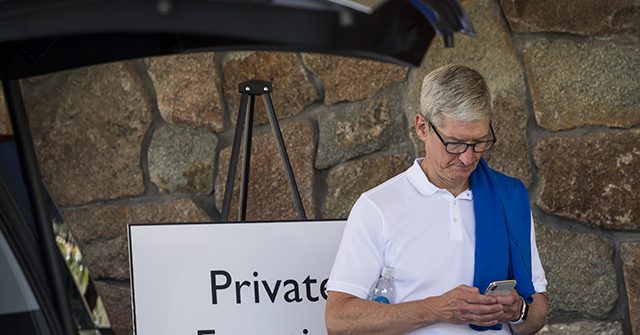Breitbart Business Digest: Dark Days for Sun Valley
The annual tech and media symposium that Allen & Co.

organizes at the Sun Valley Resort has been described as a “summer camp for billionaires.” This year it might seem a bit like a week at Easter Lake, the fictional summer camp repeatedly plagued by a hockey-masked serial killer named Jason.
The market has wounded many of those on the list of invitees. Tim Cook’s Apple’s shares have fallen 28.5 percent since the dawn of 2021. Bob Chapek presides over Disney, whose shares have fallen by just short of 40 percent since the year began. Mark Zuckerberg of Facebook bears the burden of Meta shares declining 52.48 percent. Spotify’s co-founder and CEO Daniel Ek has seen his company’s shares plunge 60 percent year-to-date.
The leader of the biggest losers club, however, is likely Reed Hastings of Netflix who has overseen a 71 percent crash in his company’s shares this year.
The Sun Valley Resort is seen ahead of the Allen & Company Sun Valley Conference on July 5, 2021, in Sun Valley, Idaho. (Kevin Dietsch/Getty Images) When Herb Allen first started arranging these conferences 39 years ago, the purpose was to bring together his Hollywood mogul and media bigwig client list with the hopes that the meeting would incite dealmaking. Over the years it has grown to include the tech and digital media giants. A smattering of establishment media and entertainment celebrities are also invited — like Tom Friedman of the New York Times and Anderson Cooper of CNN. In all likelihood, there will not be many deals hatched at this year’s shindig. For one thing, the main currency of many of these companies is their own equity, which is worth less and less with each passing day. For another, the looming recession has made the future unusually uncertain and risky for nearly all the players. Finally, it is likely that many of these companies will be cheaper next year. So what’s the rush? From left to right: Bob Iger, chairman and chief executive officer of The Walt Disney Company; Dick Costolo, former chief executive officer of Twitter; Lachlan Murdoch, co-chairman of Twenty-First Century Fox; Sundar Pichai, chief executive officer of Google; and Randall Stephenson, chief executive officer of AT&T, mingle during the annual Allen & Company Sun Valley Conference, July 13, 2018, in Sun Valley, Idaho. (Drew Angerer/Getty Images) One subject likely to receive a lot of attention is the coming advertising drought. Many of the biggest U.S. companies are likely not eager to spend a lot of money on advertising at a time when they are facing huge inflation in costs, shortages of products such as cars and truck, and labor shortfalls. Who wants to pay up to hawk goods you do not have or cannot sell at a profit? Even sectors that seem to be expanding, like leisure and dining, are already lightening up on ad spending, according to analysts at Bank of America. This will be especially alarming to Netflix and other streaming companies that have reportedly been considering selling ads to bolster stumbling subscription revenues. Recession: Not Inevitable or Already Here? President Joe Biden was finally permitted to end his record-long period of over 100 days without any print or broadcast interviews by participating in a 30-minute Oval Office interview with reporters from the Associated Press. One of his principal claims during the interview was that a recession is not inevitable, which just seems to confirm that they do not let Biden out much. A recent poll conducted by the Financial Times and the Initiative on Global Markets at the University of Chicago’s Booth School of Business found that 68 percent of economists say that the economy will enter a recession next year. Another two percent think we will be in recession this year. And a further nine percent say we’ll be in a recession in the first half of 2024. That may not demonstrate that a recession is inevitable, but it certainly is the consensus view among the experts.
The public, on the other hand, thinks we are already in a recession. A poll by the Economist and YouGov found that 55 percent of Americans think we already are in a recession. Only 22 percent say we are not in a recession.
The remaining 23 percent say they cannot be sure. Fifty-six percent of those who say we aren’t in a recession now say that we will likely be in one in the next 12 months. Those polls were both conducted before the Fed announced on Wednesday that it was raising interest rates by 75-basis points.
They also occurred before the retail sales contraction, falling housing starts, surging inflation, and crashing consumer sentiment reports sent the Atlanta Fed’s GDPNOW figure down to zero. It’s safe to assume that in the next round of polls, the number of people saying that we are already in a recession or heading towards one will be significantly higher.
Read the full article at the original website
References:
- https://variety.com/2022/biz/news/sun-valley-2022-guest-list-david-zaslav-shari-redstone-elon-musk-mark-zuckerberg-1235283555/
- https://www.breitbart.com/terms-of-use/
- https://www.breitbart.com/privacy-policy/
- https://apnews.com/article/biden-ap-interview-4d2c2f9015341f280d8078182601ec58
- https://www.ft.com/content/53fcbbf1-39e3-483c-a6f2-b0de432ed5a3
- https://docs.cdn.yougov.com/h1z6fc9iv8/econTabReport.pdf
